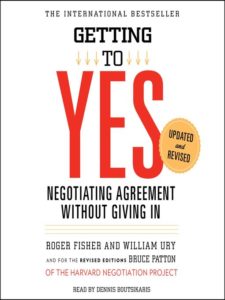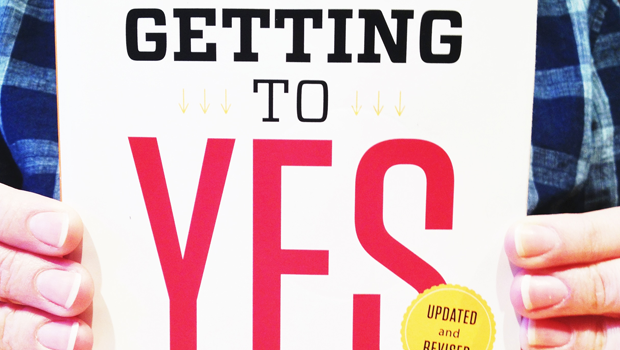The Good

“Getting to Yes” by Roger Fisher and William Ury
Negotiation is a part of life, but can be FRUSTRATING as heck. From asking for a pay raise, to getting your late fees revoked, to having a difficult conversation with your spouse.
Getting to Yes helps you understand how to reach an agreement in a principled manner. This book was AMAZING – up there with the 7 Habits of Highly Effective people.
It teaches very clearly how to deal with people who manipulate, people who get stuck in their positions, people who have more authority than you, and people who intimidate or insist on their way.
In short, it helps you stand up to others assertively, help maintain dialogue so that you can get what you want in any sort of deal. This book was SO relieving to me – gave me skills that can help me in future discussions. It’s practical, easy to understand, and effective.
The Bad
More examples would have been great. One BIG issue they did not address was WHY people manipulate or use “hard” negotiation. I know understanding that isn’t so helpful to getting agreement, but it is interesting to know.
Furthermore, the authors do recommend that you need to dig deeper to get to people’s needs and objectives – but the art of doing that WHILE staying cool headed, was not explained.
Staying calm in a negotiation is KEY. And while the methods of principle negotiation are powerful, emotions and self-interest typically run HIGH. So one needs training in negotiation skills and emotional mastery.
Bottom Line
You MUST read this if you are struggling with conflicts with others. Getting agreement and the working cooperation of others is a necessary and valuable LIFE SKILL.
This book should be mandatory reading for high school kids so that they can grow up being responsible adults.
Lessons I Learned From Reading Getting to Yes
I usually reserve this space for notes – but since I listened to the audio version, I have no notes to share. However, I wanted to share the lessons I learned while reading – and the quotes that really stood out. Enjoy.
1. Neither being a hard negotiated or soft negotiated is better. The trick is to be both.
There are many positives and negatives regarding being “hard” negotiator and for being a “soft” negotiator.
Hard negotiators want to win – it’s a battle of wills for them.
Soft negotiators want to win too – but not at the sake of the relationship. Their goal is to maintain the relationship, but they tend to get the short end of the stick.
Here are some dynamics between the two negotiating styles:
- Hard negotiator vs. Hard negotiator = Butting heads. Battle of 2 wills.
- Hard negotiator vs. Soft negotiator = Soft negotiator will lose. Soft negotiator wants to maintain the relationship, but its at the cost of resentment and the relationship.
- Soft Negotiator vs. Soft negotiator = Too much appeasement. Families typically have this dynamic. Resentment can also come up because one side may give more than needed (martyrdom).
The trick is to be both hard and soft. Hard on the problem, but soft on the person.
2. Separate the People from the problem
The relationship and the problem become entangled. You must separate them. The intention of finding objective criteria and defining the problem – should prevent you from focusing on the person.
- On both the giving and receiving end, we are likely to treat people and problem as one. Within the family, a statement such as “The kitchen is a mess” or “Our bank account is low” may be intended simply to identify a problem, but it is likely to be heard as a personal attack. Anger over a situation may lead you to express anger toward some human being associated with it in your mind. Egos tend to become involved in substantive positions.
3. Focus on Interests, Not Positions
Positions are when someone says “This is what I want!” Arguing over positions can hurt relationships because egos get invested.
- Understanding their point of view is not the same as agreeing with it. It is true that a better understanding of their thinking may lead you to revise your own views about the merits of a situation. But that is not a cost of understanding their point of view, it is a benefit. It allows you to reduce the area of conflict, and it also helps you advance your newly enlightened self-interest.
- The more attention that is paid to positions, the less attention is devoted to meeting the underlying concerns of the parties.
4. Invent Options for Mutual Gain
Don’t blame the other side for the problem. Put yourself in their shoes and in fact, ask them to put themselves in your shoes. Discuss each other’s perceptions and concerns.
Make sure they have a stake in the outcome by making sure they are a participant in the process. Make your proposal consistent with their values.
Brainstorm with the other side – but don’t allow criticism for any of the options presented.
- “Give them a stake in the outcome by making sure they participate in the process. If they are not involved in the process, they are unlikely to approve the product.”
5. Insist on Using Objective Criteria
Insist on fair standards and procedures.
- “Shifting discussion in a negotiation from the question of what the other side is willing to do to the question of how the matter ought to be decided does not end argument, nor does it guarantee a favorable result. It does, however, provide a strategy you can vigorously pursue without the high costs of positional bargaining.”
- “Pressure can take many forms: a bribe, a threat, a manipulative appeal to trust, or a simple refusal to budge. In all these cases, the principled response is the same: invite them to state their reasoning, suggest objective criteria you think apply, and refuse to budge except on this basis. Never yield to pressure, only to principle.”
6. BATNA (Best Alternative to a Negotiated Agreement)
Always have a best alternative to a negotiated agreement.

